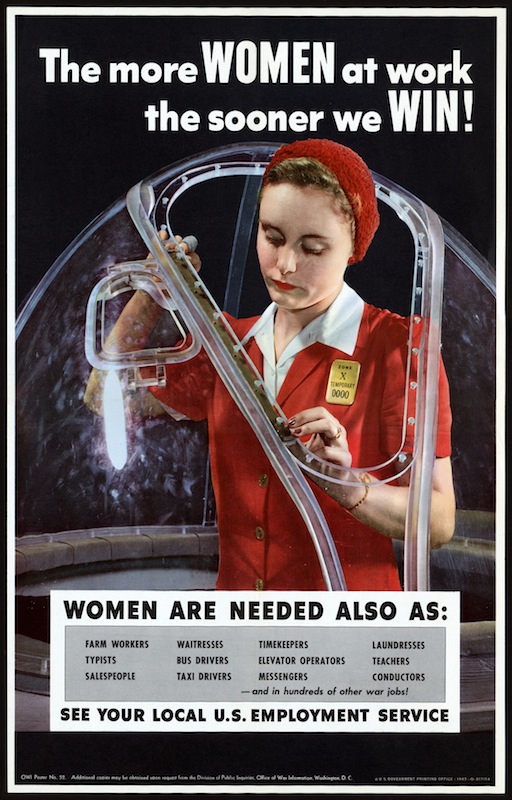
On Tuesday, during his State of the Union address, President Obama spoke of helping middle-class families afford childcare — and, he pointed out, we know we can do it because we’ve done it before. “During World War II, when men like my grandfather went off to war, having women like my grandmother in the workforce was a national security priority — so this country provided universal childcare,” he said. “In today’s economy, when having both parents in the workforce is an economic necessity for many families, we need affordable, high-quality childcare more than ever.”
That program, established in 1942, was a joint venture of the War Manpower Commission and the Office of Defense Health and Welfare Services. And, it turns out, getting the program in place wasn’t just a matter of freeing up men and women to contribute to the war effort — it was also a “national security” issue on the home front, as unattended children across the nation got up to no good.
Here’s how TIME explained the program in the July 27, 1942, issue:
If father & mother both must work to win the war, somebody will have to look after the children. In war factories alone there are already 1,000,000 women workers, and 3,000,000 more are expected by next year. The children of some of these women have been found locked up in cars and Washington Government offices, or wandering the streets with door keys around their necks. Child delinquency in the U.S. is up sharply; Washington itself has had a wave of juvenile housebreaking and shoplifting. Last week Washington decided it was time to do something about the wartime care of U.S. children.
Federal Security Administrator Paul V. McNutt had appointed a child-care coordinator: sandy-haired Charles Irwin Schottland of the Children’s Bureau. Mr. Schottland went straight to Mr. McNutt’s War Manpower Commission for help. His problem: how to overcome the scarcity of servants and of day nurseries. He also had a plan: let the U.S. make grants to States to finance a variety of child-care facilities.
WMPC promptly approved the plan and decided to issue a directive for the Office of Defense Health and Welfare Services to carry it out. This week Coordinator Schottland prepared to tackle Congress for the necessary funds. As a start, he already has $6,000,000 for 1,250 WPA nursery schools.
It’s worth noting that the Works Progress Administration nursery schools mentioned in that piece were not originally related to the war effort; in fact, economic concerns — like the ones facing the nation today — were the impetus for their establishment. During the Great Depression, the nation faced a double-whammy of needy children and unemployed teachers; so, in October of 1933, Harry Hopkins of the Federal Emergency Relief Administration announced that more than a thousand nursery schools would be established nationwide through the Emergency Education Programs.
Those original WPA nursery schools technically closed, along with the WPA itself, in 1943. By then, the defense program had launched, and nursery schools and childcare facilities were able to apply to be subsidized with Defense funds, through the Lanham Act, to try to stay open. And, as a bonus, defense funds — unlike the WPA programs — weren’t restricted to families in poverty, which meant that middle-class families could also benefit from those childcare centers, making the WWII-era program almost universal. (Communities did have to prove that they were impacted by the war effort in order to get federal funds.)
One 2013 study found that the decision to fund childcare with the Lanham Act did in fact lead to a greater rate of employment among mothers, and that their children were better off in the long run. But, unlike the program Obama envisions for the modern world, the Lanham Act childcare centers were always meant to be a temporary solution. As soon as peace came, women were expected to return home to care for their children themselves. Congress gave women a few extra months, through March of 1946, to make arrangements, and then the childcare centers were closed.
At least one person, however, thought back then the way the President thinks today.
In her “My Day” column from Sept. 8, 1945, the former First Lady Eleanor Roosevelt described the letters she had received from women who wanted the centers to stay open: “But we have to face the fact that there are married women with young children who have to go to work. In such cases, it would seem to be in the interests of the community to organize child care centers and see that they are properly run,” she wrote. “These children are future citizens, and if they are neglected in these early years it will hurt not only the children themselves, but the community as a whole. Many communities can carry the expense of such organization for children’s centers without any state or federal help. But where state help is needed, it should be given; and when states are incapable of giving sufficient help, it should be forthcoming on a national scale as it has been in the war years.”
More Must-Reads from TIME
- Donald Trump Is TIME's 2024 Person of the Year
- Why We Chose Trump as Person of the Year
- Is Intermittent Fasting Good or Bad for You?
- The 100 Must-Read Books of 2024
- The 20 Best Christmas TV Episodes
- Column: If Optimism Feels Ridiculous Now, Try Hope
- The Future of Climate Action Is Trade Policy
- Merle Bombardieri Is Helping People Make the Baby Decision
Write to Lily Rothman at lily.rothman@time.com